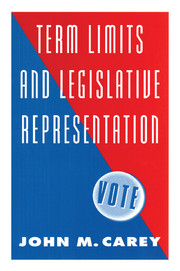7 - Applying lessons about term limits
Published online by Cambridge University Press: 06 July 2010
Summary
The broadest conclusion drawn from the empirical evidence in this study is that legislators are responsive to those who control their future careers. There are a number of other conclusions, more specifically pertaining to term limits, that can be drawn as well. First, term limits do not necessarily eliminate political careerism among legislators, even where they preclude parliamentary careers. Chapter 3 shows that most Costa Rican deputies have substantial political experience prior to their service as legislators, and that they overwhelmingly seek to continue their political careers after their Assembly service. A second conclusion is that term limits do not necessarily eliminate behavior normally associated with pure personal electioneering among legislators. Chapter 4 shows that Costa Rican legislators, despite their absolute lack of personal electoral connection with constituents, still devote tremendous amounts of energy to providing favors for constituents and pork-barrel spending projects for specific communities. A third conclusion is that term limits are likely to affect the cohesiveness of parties within legislatures. The comparison between Costa Rica and Venezuela in Chapter 5 demonstrates that where term limits reduce the control party leaders have over legislators' future careers, they also reduce the voting discipline of legislative parties. It stands to reason, of course, that the converse should hold as well: if imposing term limits on an electoral system were to increase the control of party leaders over postassembly careers, then term limits should increase the voting discipline of legislative parties (Weldon 1994).
- Type
- Chapter
- Information
- Term Limits and Legislative Representation , pp. 183 - 200Publisher: Cambridge University PressPrint publication year: 1996



